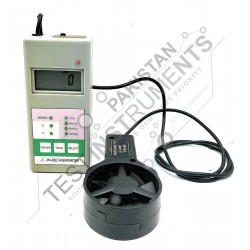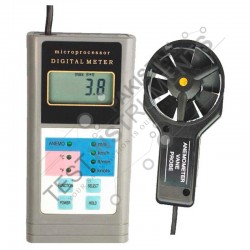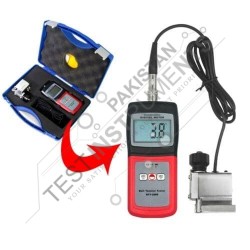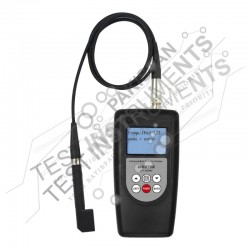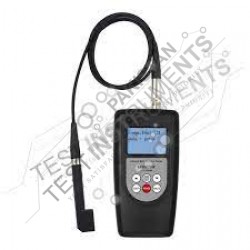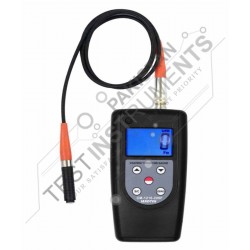MH100
MH100
- Stock: Pre-Order
- Model: Portable Leeb hardness tester
Product Overview
MH100 series pocket hardness meters, also
known as pen-type hardness tester, based on Leeb hardness
measuring principle, quick and easy on-site test the hardness of series
metal materials, support free conversion between Richter, Brinell, Rockwell
hardness scale and others,integrated compact design, small size, portable,
highly integrated, stable and reliable performance, supporting data transfer
and print the stored function. Widely used in failure analysis of metal
processing and manufacturing, special equipment, permanent assembly, inspection
and other fields. Particularly suitable for large parts and non-removable part
of the site hardness testing. It is professional precision instrument to
improve the pass rate of production and cost savings .
Function & application
Die cavity of molds
Bearings and other parts
Failure analysis of pressure vessel, steam generator and
other equipment
Heavy work piece
The installed machinery and permanently assembled parts.
Testing surface of a small hollow space
Requirements of formal original
record for test results
Material identification in the warehouse of metallic
materials
Rapid testing in large range and multi-measuring areas for
large-scale work piece
Working Principle
The energy quotient is quoted in the hardness unit HL and is
calculated from comparing the impact and rebound velocities of the impact body.
It rebounds faster from harder samples than from softer ones, resulting in a
greater energy quotient which is defined as 1000×Vr/ Vi.
HL=1000×Vr/ Vi
Where:
HL— Leeb hardness value
Vr — Rebound velocity of the impact body
Vi — Impact velocity of
the impact body
Working Conditions
Working temperature:- 10℃~+50℃;
Storage temperature:-30℃~+60℃
Relative humidity: ≤90%;
The surrounding environment should avoid of vibration,
strong magnetic field, corrosive medium and heavy dust.
Instrument Features
Based on the principle of Leeb hardness testing theory. It
can measure the Leeb hardness of all metallic
materials.
High-contrast Segment LCD ,easy to use
Support Steel ,when using D sensor to test steel,it can
show HB directly.
Software calibration automatically.
100 groups (impact times 32 ~ 1) hardness measurements, each
set of data includes single testing value,average value, measurement date /
time, impact direction, frequency, material, hardness, and
other information.
Real-time display the remaining battery power,
charging progress is displayed while charging.
USB interface to PC for data communication
Data processing software can do transmission measurements,
the measured value storage management, statistical analysis of the
measured value, the measured value of the print report and batch set the
instrument parameters .
Integrated compact design, small size, portable, highly
integrated, stable and reliable performance, suitable for harsh
environment field operations, prevent from vibration, shock and electromagnetic
interference.
Dimension:148mm×33mm×28mm
Operating Method and Attentions
1 Start-Up
Press the power key to start up the
instrument. The instrument then comes into working mode.
2 Loading
Pushing the loading-tube downwards until contact is felt.
Then allow it to slowly return to the starting position or using other method
locking the impact body.
3 Localization
Press the impact device supporting ring firmly on the
surface of the sample, the impact direction should be vertical to the testing
surface.
4 Testing
-Press the release button on the upside of the impact device
to test. The sample and the impact device as well as the
operator are all required to be stable now. The action
direction should pass the axis of the impact device.
-Each measure area of the sample usually need 3 to 5 times
of testing operation. The result data dispersion should not
more than mean value±15HL.
-The distance between any two impact points or from the
center of any impact point to the edge of testing sample
should conform to the regulation of Table 4-1.
-If want accurate conversion from the Leeb hardness value to
other hardness value, contrastive test is needed to get
conversion relations for the special material. Use
inspection qualified Leeb hardness tester and corresponding
hardness tester to test at the same sample
respectively. For each hardness value, each measure homogeneously 5
points of Leeb hardness value in the surrounding of
more than three indentations which need conversion hardness,
using Leeb hardness arithmetic average value and
corresponding hardness average value as correlative value
respectively, make individual hardness contrastive
curve. Contrastive curve at least should include three groups of
correlative data.
|
Type of Impact Device |
Distance of center of the two indentations |
Distance of center of the indentation to sample edge |
|
Not less than (mm) |
Not less than (mm) |
|
|
D |
3 |
5 |
|
DL |
3 |
5 |
|
C |
2 |
4 |
After each impact operation, the LCD will display the current measured value, impact times plus one, the buzzer would alert a long howl if the measured value is not within the valid range. When reaching the presetting impact times, the buzzer will alert a long howl. After 2 seconds, the buzzer will alert a short howl, and display the mean measured value.



